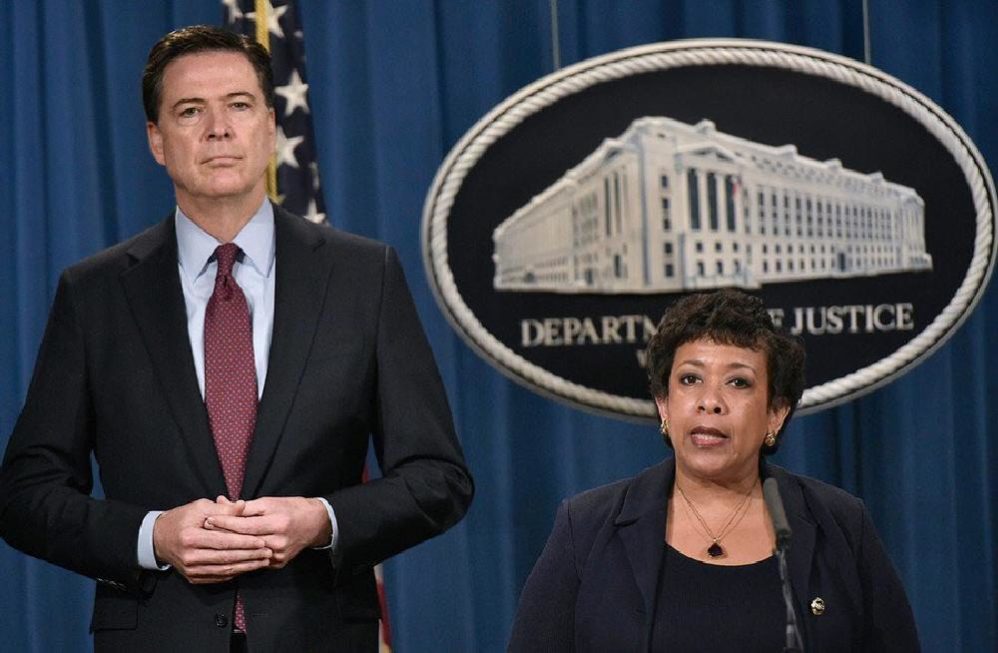The Horowitz report demonstrates that there are no limits to James Comey’s hypocrisy and self-regard.
By Judith Miller
June 15, 2018

James Comey and Loretta Lynch
The Justice Department’s Office of the Inspector General’s long-awaited report found no explicit political agenda or motivation for former FBI director James Comey’s “extraordinary” violations of FBI and DOJ rules, regulations, policies, and procedures. Nor did the 568-page report challenge Comey’s decision not to prosecute Hillary Clinton for her use of a private email in handling secret information while serving as President Barack Obama’s Secretary of State. “We found no evidence that the conclusions by department prosecutors were affected by bias or other improper considerations,” concluded Michael Horowitz, the independent-minded inspector general, after reviewing 1.2 million documents and interviewing more than 100 witnesses.
The report is silent on what motivated Comey’s stunning errors of judgment in breaking with longstanding policy by publicly discussing his investigation into Clinton’s handling of secret government information. But while the report does not address his personal motivation, it devastates the decisions and actions Comey has tried for months to defend—in congressional testimony, a bestselling book, and a much publicized book tour in which he has accused President Donald Trump of violating the Constitution, American law, and being unfit for office.
“Insubordinate” is what the report calls Comey’s disregard of the FBI’s and the Justice Department’s “established procedures and norms” and his repeated preference for his “own subjective, ad hoc decision-making.” The inspector general’s verdict on that conduct affirms Trump’s decision to fire Comey, and is likely to haunt the former FBI director for the rest of his professional life. And it should.
The weighty report’s point-by-point criticism of Comey’s deviation from rules and procedures suggests a motivation. So, too, does the title of his own account of life in the law enforcement trenches—A Higher Loyalty. In his book, Comey emerges not so much as he portrays himself—a courageous defender of truth and embodiment of judicial virtue—but as a man consumed by self-righteousness. Department of Justice rules and policies may dictate that prosecutors who decline to bring an indictment against a target remain silent as to the reasons, but Comey decided that the American people were entitled to his opinion of Clinton’s use of a private email server for official business as “exceedingly reckless.” Never mind that the report discloses something he must have known while writing his self-serving non mea culpa—that Comey himself frequently used his own personal email and laptops to conduct official business.
Comey not only publicly discussed the politically explosive investigation’s conclusions in contravention of Justice Department norms; he also decided not to consult with senior Justice Department officials about his decision or tell his boss, Attorney General Loretta Lynch, that he had decided to speak publicly about it. “We found that Comey largely based his decisions on what he believed was in the FBI’s institutional interests and would enable him to continue to effectively lead the FBI as its Director,” Horowitz wrote. Comey alone would decide what information about investigations the American people were entitled to know.
Comey made a regular practice of leaking classified information to the press through friends and associates, thus maintaining his own ostensible aloofness from the media fray. He oversaw an agency where top officials spoke of derailing Trump’s candidacy, and where FBI employees were feted by members of the press, who gave them tickets and treated them to golf outings. Comey was told by then-Attorney General Loretta Lynch to refer to the Clinton email probe as a “matter,” thereby downplaying it, and he complied; the fact that his bizarre choices about announcing the various reopenings of the investigation may have redounded to Trump’s benefit does not detract from his willingness to follow in this case a seemingly politically motivated order.
Now more social-media savvy, Comey had a gracious, measured response to the inspector general’s attack on his conduct. While he disagreed with some of the inspector general’s “reasonable” conclusions, he tweeted, he respected the office and prayed that no FBI director would ever again face such an “unprecedented situation.” Comey clearly remains focused on his own image. The Horowitz report’s revelations, though, will surely undermine Comey’s standing as a credible witness for Robert Mueller, should the special prosecutor try to bring charges against President Trump or his senior campaign aides in the ongoing investigation of Russian interference in the 2016 election. Comey is isolated: he will never be accepted by the Right, who largely back President Trump’s decision to fire him, nor by the Left, who will never forgive him for helping to sink Clinton’s campaign. Comey will go down as one of the worst examples of federal service in modern history.
Judith Miller is a City Journal contributing editor and author of The Story: A Reporter’s Journey.
No comments:
Post a Comment